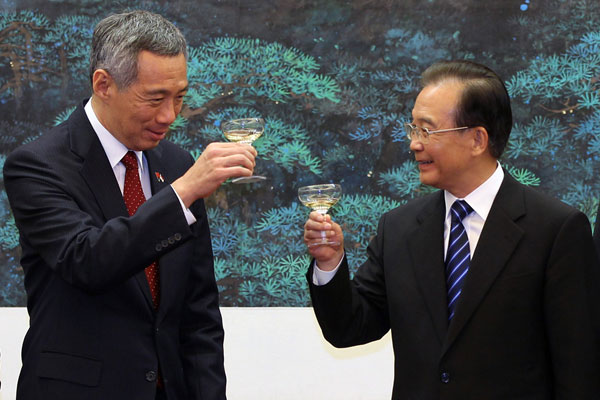|
 Premier Wen Jiabao shares a toast with Singaporean Prime Minister Lee Hsien Loong after talks at the Great Hall of the People in Beijing on Thursday. [Feng Yongbin / China Daily] |
The Association of Southeast Asian Nations should adopt a "neutral and forward-looking" position on South China Sea disputes and encourage parties involved to solve the issue through peaceful means, Singaporean Prime Minister Lee Hsien Loong said on Thursday.
Lee made the remarks while addressing senior officials at the Party School of the Central Committee of the Communist Party of China during a six-day official visit.
Observers said the Singaporean leader's speech highlights the country balancing itself as a bridge between the East and the West.
Calling for a responsible and peaceful solution, Lee said ASEAN should not take sides but should address the problem otherwise the organization's influence will be damaged.
Song Yinghui, a specialist on Singaporean studies with the China Institutes of Contemporary International Relations, said Lee expressed his country's consistent position.
"Singapore's development depends on Southeast Asia, therefore it values ASEAN's influence within the region."
Lee stressed his nation's critical interests in the region.
"First, it is in Singapore's interests to see international disputes settled in accordance with international laws and in particular, the United Nations Convention on the Law of the Sea. Second, navigational freedom is another fundamental interest since trade and waterways are a lifeline for Singapore."
He also emphasized ASEAN should be united to exert its influence on the international stage regardless of how the issue is resolved.
"If ASEAN is weakened by escalating maritime tensions, Singapore's security and influence will be hurt," he added.
Song emphasized Singapore shares China's goals.
"Of course Singapore's position is due to its own considerations. But it is concerned about regional peace and stability and that means it has the same goals and shares common interests with China."
Lee noted that many countries are paying close attention to both China and ASEAN.
"They want to find out how China settles difficult problems with its neighbors and what role a rising China can play for the rest of the world. They are also watching how ASEAN deals with the issues."
He indicated ASEAN also needed to find "a new foothold" for its own development with a rapidly growing China.
"Both islands, and resources under the sea, are important, but what is more important is the long-term international standing of the region," Lee said.
Song said China should view such "close attention" positively because it is inevitable that some countries will view its economic expansion differently than others.
"Such close attention will help neighboring countries realize China is willing to maintain peace and prosperity," she added.
Speaking of China and the US, the Singaporean Prime Minister said his nation expects a sound development of relations between the two countries.
"We don't want to see ties between China and the US worsen or even have to pick one against the other. Singapore is willing to help foster good development of Sino-US relations," Lee said.
Ties: Cooperation stressed
Zhang Jiuhuan, former Chinese ambassador to Singapore, said Singapore has maintained close contact with both the East and the West, and views itself as "a bridge" between the two.
Lee pointed out wisdom is required from both Beijing and Washington to develop trust since their ties are the most important in the world.
Former ambassador Zhang said that China was not against the US in the region.
"Beijing also hopes Washington to be a stabilizing factor in the region. The key point is it must be truly positive and constructive. But what it has done within the region is quite the opposite. Its strategic shift back to Asia has actually increased suspicion among Asian countries," Zhang argued.
Lee met Premier Wen Jiabao later on Thursday and both leaders vowed to advance China-Singapore cooperation and cooperation between China and ASEAN.
"The development of China-Singapore relationship benefits people in both countries, and has a broad and positive influence in East Asia," Wen said, urging more cooperation in areas including investment, finance and the green economy.
China hopes Singapore continues to play an important role in uniting China and ASEAN and deepening cooperation, Wen said.
"China's development is good for both Asia and the world," Lee said.
Lee began his third visit to China since taking office in 2004 from Chengdu in Southwest China's Sichuan province on Sunday afternoon, and carried on to Tianjin, where the Sino-Singapore Eco-city is located.
Trade between Singapore and China has surged after the establishment of diplomatic ties in 1990. Singapore is China's third-largest trading partner among ASEAN member states. Trade in 2011 reached $63.48 billion, up 11.2 percent.
Contact the writers at wangchenyan@chinadaily.com.cn and chengguangjin@chinadaily.com.cn
